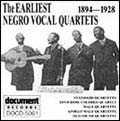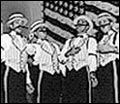Additional Audio |
|
 |
The Standard Quartette, an early African-American quartet, sings the spiritual "Poor Mourner." (Columbia Records, approx. 1896) |
 |
Billy Murray and the Haydn Quartet sing "By the Light of the Silvery Moon." The group was making records for Edison Records as early as 1894. (Victor Records, 1909) |
 |
The Columbia Colored Quartet sings "I'm Wild About Moonshine" (approx. 1921) |
 |
The Shannon Quartet sings the barbershop classic "Let Me Call You Sweetheart." (1926) |
 |
The Flat Foot Four sing "Shine" (1940s) |
 |
The Gas House Gang sings "Shine" (1990s) |
 |
The Okie Four sing "Bright Was the Night" (1940s) |
 |
The Gas House Gang sings "Bright Was the Night" (1990s) |
 |
The Gas House Gang sings through an explanation of the "barbershop seventh chord." It's what makes barbershop barbershop. |
 |
Barbershop quartet expert David Wright and NPR's Jim Wildman listen to barbershop tunes and discuss the barbershop style |
 |
Barbershop Quartets
 Listen to Jim Wildman's report Listen to Jim Wildman's report Watch the Gas House Gang singing "Bright Was the Night." (Video: SPEBSQSA) Watch the Gas House Gang singing "Bright Was the Night." (Video: SPEBSQSA)
|
March 18, 2002 -- Think of barbershop quartets and this image easily comes to mind: four handlebar-mustached white men in straw hats and striped vests singing "Sweet Adeline" in four-part harmony.
But the roots of barbershop actually date back to singing by African Americans in the late 19th century, Jim Wildman reports for Morning Edition as part of the Present at the Creation series on American icons.
"Barbering was a kind of low-status job and it was held in some areas by gypsies and European immigrants, in other areas, by African Americans," says Gage Averill, chairman of the music department at New York University and author of the upcoming book Four Parts, No Waiting: A Social History of American Barbershop Harmony. Barbershops often served as black community centers, "the place where guys hung out," he says. "A lot of harmony was created in these barbershops."
Thomas Johnson Jr., 89, grew up singing early barbershop tunes with friends in barbershops and on street corners in Richmond, Va., in the early 1900s. "During that time, it was just anyway you sing it was alright. Hand it down, throw it down, any way you get it down. Whatever came to the ear -- that's barbershop."
But barbershop quartets soon became associated with white performers when the recorded version of the music became widely distributed, Averill says. Thomas Edison's early phonograms spread to parlors around the country, "but they needed content," Averill says. "So they actively sought out groups to record. You couldn't bring an orchestra... or a chorus into the early studios. They were cramped and you had to sing right into the horn (microphone). So it favored small groups and these quartets were just perfect."
By the end of the 19th century, phonogram companies presented competing quartets, Averill says. "And those quartets -- the ones that they were really promoting -- were by and large white quartets. And it was the promotion of these groups and their dissemination everywhere in North America and beyond that really fixed the identity of barbershop in a white context."
In addition, scholars incorrectly traced barbershop's origin to England. Library of Congress musicologist Wayne Shirley says the misperception started in the 1930s, when an influential historian, Percy Skoals, was misled by an entry in the Oxford English Dictionary.
Shirley explains: "There was an Elizabethan phrase about 'barber's music,' music that was made in barbershops, and so (Skoals) decided that the barbershop quartet came basically from England. And unfortunately it's just not true. Barber's music, which simply meant the kind of stuff you hear when there are a couple of lutes around and people are getting haircuts and passing the time by singing rather badly, is not barbershop."
Singer Thomas Johnson Jr. says he doesn't know of any black quartets singing barbershop these days. He says that white singers "polished it up some, just like silver and gold... Barbershop music is very beautiful music. But it was a black tradition."
Other Resources
 The Barbershop Jukebox - Harmony on Demand
The Barbershop Jukebox - Harmony on Demand
 A multimedia presentation by David Wright on the evolution of barbershop style
A multimedia presentation by David Wright on the evolution of barbershop style
• The Society for the Preservation and Encouragement of Barber Shop Quartet Singing in America
• The Gas House Gang
• Sweet Adelines International
• Information on Thomas Edison and old cylinder recordings at www.tinfoil.com and http://www.waxcylinders.com/
But the roots of barbershop actually date back to singing by African Americans in the late 19th century, Jim Wildman reports for Morning Edition as part of the Present at the Creation series on American icons.
"Barbering was a kind of low-status job and it was held in some areas by gypsies and European immigrants, in other areas, by African Americans," says Gage Averill, chairman of the music department at New York University and author of the upcoming book Four Parts, No Waiting: A Social History of American Barbershop Harmony. Barbershops often served as black community centers, "the place where guys hung out," he says. "A lot of harmony was created in these barbershops."
Thomas Johnson Jr., 89, grew up singing early barbershop tunes with friends in barbershops and on street corners in Richmond, Va., in the early 1900s. "During that time, it was just anyway you sing it was alright. Hand it down, throw it down, any way you get it down. Whatever came to the ear -- that's barbershop."
But barbershop quartets soon became associated with white performers when the recorded version of the music became widely distributed, Averill says. Thomas Edison's early phonograms spread to parlors around the country, "but they needed content," Averill says. "So they actively sought out groups to record. You couldn't bring an orchestra... or a chorus into the early studios. They were cramped and you had to sing right into the horn (microphone). So it favored small groups and these quartets were just perfect."
By the end of the 19th century, phonogram companies presented competing quartets, Averill says. "And those quartets -- the ones that they were really promoting -- were by and large white quartets. And it was the promotion of these groups and their dissemination everywhere in North America and beyond that really fixed the identity of barbershop in a white context."
In addition, scholars incorrectly traced barbershop's origin to England. Library of Congress musicologist Wayne Shirley says the misperception started in the 1930s, when an influential historian, Percy Skoals, was misled by an entry in the Oxford English Dictionary.
Shirley explains: "There was an Elizabethan phrase about 'barber's music,' music that was made in barbershops, and so (Skoals) decided that the barbershop quartet came basically from England. And unfortunately it's just not true. Barber's music, which simply meant the kind of stuff you hear when there are a couple of lutes around and people are getting haircuts and passing the time by singing rather badly, is not barbershop."
Singer Thomas Johnson Jr. says he doesn't know of any black quartets singing barbershop these days. He says that white singers "polished it up some, just like silver and gold... Barbershop music is very beautiful music. But it was a black tradition."
Other Resources
 The Barbershop Jukebox - Harmony on Demand
The Barbershop Jukebox - Harmony on Demand
 A multimedia presentation by David Wright on the evolution of barbershop style
A multimedia presentation by David Wright on the evolution of barbershop style
• The Society for the Preservation and Encouragement of Barber Shop Quartet Singing in America
• The Gas House Gang
• Sweet Adelines International
• Information on Thomas Edison and old cylinder recordings at www.tinfoil.com and http://www.waxcylinders.com/


Polk Miller's Old South Quartet (1909).
Photo: SPEBSQSA, The Harmonizer, July/August 2001
 The Four Barbers, U.S. Navy Band, in an undated photo.
The Four Barbers, U.S. Navy Band, in an undated photo.Photo: Library of Congress
 The Buffalo Bills won the barbershop society's international championship in Omaha in 1950.
The Buffalo Bills won the barbershop society's international championship in Omaha in 1950.Photo: SPEBSQSA, Heritage of Harmony, copyright 1988, SPEBSQSA, Inc.
 The Gas House Gang was formed in 1987 and has performed worldwide.
The Gas House Gang was formed in 1987 and has performed worldwide.Photo: The Gas House Gang